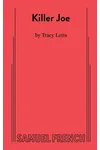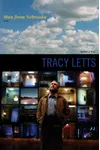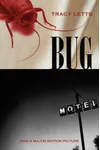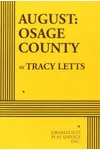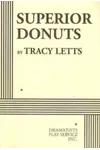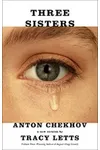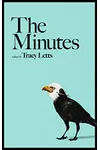Picture an Oklahoma-born storyteller who spun raw, gritty tales like August: Osage County into Pulitzer Prize gold—meet Tracy Letts! With a knack for crafting psychologically intense dramas and a Tony-winning acting career to boot, Letts has carved a unique path in American theater and film. His stories, brimming with dysfunctional families and dark humor, pull you in and don’t let go.
Born in 1965 in Tulsa, Letts grew up in a creative household, surrounded by books and theater. His journey from small-town Oklahoma to Broadway stardom is a tale of grit, talent, and a touch of macabre magic. Let’s dive into the world of this multifaceted artist whose work continues to captivate audiences worldwide.
The Making of Tracy Letts
Tracy Letts was raised in Durant, Oklahoma, the son of novelist Billie Letts and actor-professor Dennis Letts. Creativity ran in the family, with his mother penning bestsellers and his father treading the boards in community theater. Young Tracy, a self-described late bloomer, was inspired by his parents’ artistic pursuits. After a brief stint at Southeastern Oklahoma State University, he dropped out to chase acting dreams, moving to Dallas and then Chicago at 20. There, he found his home at the Steppenwolf Theatre Company, where he honed his craft as both actor and writer.
In Chicago, Letts co-founded Bang Bang Spontaneous Theatre, rubbing elbows with future stars like Michael Shannon. His early acting gigs included TV shows like Seinfeld, but it was his playwriting that would soon steal the spotlight. His first play, Killer Joe, written in 1991, marked him as a bold new voice unafraid of pushing boundaries.
Tracy Letts’s Unforgettable Stories
Letts’s plays are raw, visceral, and often darkly funny, blending the grit of a Texas trailer park with the emotional depth of Tennessee Williams. His breakthrough, Killer Joe (1991), is a shocking tale of a dysfunctional family hiring a hitman, dripping with violence and black humor. Its graphic intensity initially scared off producers, but its eventual success in New York and London cemented Letts’s reputation.
Bug (1996) followed, a paranoid love story about a cocaine addict and a drifter obsessed with insects, showcasing Letts’s ability to weave psychological tension with human connection. His magnum opus, August: Osage County (2007), is a sprawling family drama that won the Pulitzer Prize and Tony Award. Inspired by Letts’s own family history, including his grandfather’s suicide, it dissects the Weston family’s secrets with biting wit and heart-wrenching honesty. The Minutes (2017), a Pulitzer finalist, tackles American history’s dark underbelly through a deceptively simple city council meeting.
Letts’s style is unmistakable: he crafts complex, flawed characters who grapple with addiction, faith, and identity. His dialogue crackles with authenticity, and his use of sound as a storytelling tool adds a musical rhythm to his work. Whether adapting his plays into films or acting in them, Letts brings a raw intensity that resonates.
Why Tracy Letts Matters
Tracy Letts has redefined American theater with his fearless exploration of human flaws and societal issues. His plays confront racism, gender bias, and the legacy of historical traumas, making them both timeless and urgently relevant. As an actor, his Tony-winning performance in Who’s Afraid of Virginia Woolf? (2013) and roles in films like Lady Bird and Ford v Ferrari showcase his versatility.
Letts’s impact extends beyond awards. His work challenges audiences to face uncomfortable truths while finding humor in the chaos. By drawing from his Oklahoma roots and personal experiences, he’s created a body of work that feels both universal and deeply personal, earning him a place among the greats like Eugene O’Neill and Arthur Miller.
- Born: July 4, 1965, Tulsa, Oklahoma
- Key Works: Killer Joe, Bug, August: Osage County, The Minutes
- Awards: Pulitzer Prize for Drama (2008), Tony Award for Best Play (2008), Tony Award for Best Actor (2013)
Ready to dive into Tracy Letts’s thrilling world? Grab August: Osage County and brace yourself for a rollercoaster of dark humor and raw emotion!
